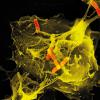Katharina Schmack, who has been awarded over £5m from Wellcome to study the effects of antipsychotic drugs on the immune system, discusses her research.

The human immune system is a deeply complex biological process that marshals the organs, cells, tissues, proteins and chemicals in response to any threats posed by invasive pathogens and other potentially harmful substances. It is the principal barrier against infection and disease.
Any system that mobilises so many different parts and functions of the body into such an intricate and collective counterattack against an emerging danger is bound to hold many mysteries. In recent years the relationship of the immune system to the gut biome, and vice versa, has been the subject of much speculation; likewise, the link between the immune system and mental health has been explored. Earlier this year, for example, a study from the Institute of Psychiatry, Psychology and Neuroscience at King’s College London identified a protein involved in the immune response in the brain that might be connected to a higher risk of developing severe mental health issues.
Growth of research
Along the same lines, the Francis Crick Institute has just announced the start of an eight-year research programme to explore the relationship between the immune system and psychosis (when mental health deteriorates to an extent where a person loses touch with external reality). Specifically, it will be looking at the effect of traditional antipsychotic drugs. Leading the eight-year study is Crick Clinical Group Leader Dr Katharina Schmack, who acknowledges the growth of research in this area.
Even in adulthood, infections can increase the risk for later developing psychosis
“Recent years have brought a wealth of evidence that at least in some cases psychosis may be caused by immune responses that are not quite rightly regulated,” she says. Some of the key avenues of enquiry have been genetic studies. “These have pointed to genes that are linked to schizophrenia, for example, which is one of the main psychotic disorders, and that are in important regions for the immune system. We also know that having an autoimmune disease increases the risk of developing psychosis. It works the other way around too, as having psychosis increases the risk of an autoimmune disease.”
Other research has pointed to a possible role for previous in utero maternal infections and other infections later in childhood. “Even in adulthood, infections can increase the risk for later developing psychosis, which also suggests there might be some link to the immune system,” says Schmack. “Another line of evidence and one that is important for our study, is that in the blood and in the spinal fluid that surrounds the brain we find that inflammatory cytokines, which are basically immune-signalling messengers, are increased in psychosis.”
Antipsychotic drugs
The focus of the Crick study will be the long-standing drugs used to treat psychosis and how they interact with the immune system. “They do reduce the symptoms of psychosis, at least in the first instance, and there is some evidence that they might actually modulate the immune system. We know this from studies where mice that have an autoimmune disorder, though not psychosis, are treated with antipsychotics and the signs of this disorder become better.”
Despite the mounting evidence, the challenge of making sense of the immune system’s complexity remains. “It is very difficult to disentangle cause and consequence,” says Schmack. “We know that people with psychosis show a lot of other differences. They smoke much more than the general population, for instance. So if there’s an immune change, is this really causal? Might it be due to the treatment that we give them, or is it just caused by some other factor that doesn’t really have anything to do with psychosis?”
The study
Separating cause and consequence in such an elaborate biological system is a task that Schmack and her team intend to address with the latest techniques in immunology and neuroscience.
“We are going to recruit people who are affected by psychosis and observe them while they’re undergoing antipsychotic treatment. We will draw blood from them at the beginning of the treatment and at the end, and then we will use very new methods where we need just a tiny amount of blood to analyse a vast range of immune parameters with a very high throughput.”
The next step is to use machine learning to identify which of the immune changes seen are related to psychosis and which might be related to factors such as smoking, gender or weight. In parallel with this, a mouse model will help to establish potential causal links.
“In a mouse model we can manipulate the immune system. We can, for example, put an immune change into a mouse and then see whether the mouse develops behaviour that is consistent with psychosis. We have a method developed in our lab that allows us to measure or to quantify hallucination-like behaviour in mice.”
Ultimately, the aim is to generate results that can inform the development of better treatment for psychosis. “This is why I’m excited about this project. The treatments we have are effective but they do have some severe side effects and they’re not very good in the long term. We need to make some advances here. We have immune modulatory drugs from other diseases that might be repurposed if we understand which immune mechanism we need to target.”
Katharina Schmack
2001-08: MD/PhD equivalent, Charité, Berlin
2009-18: Postdoctoral Researcher, Psychiatry Resident, Principal Investigator, Charité
2018: Research Fellowship at Cold Spring Harbor Laboratory, New York
2021: Clinical Group Leader, the Francis Crick Institute
Fundamental insights
The study might also provide some insight into the variability between individuals, which could lead to personalised treatment. “One person’s immune mechanism might need a specific modulatory drug versus another person. We know, for example, that immune cells have a lot of well-defined surface molecules that are directly targetable by immune modulatory drugs. It’s a smaller step from identifying immune mechanisms to treatment as opposed, for example, to identifying a gene to treatment.”
The bigger picture is that the Crick study will add to the bank of knowledge on how the immune system affects the brain and how the brain affects the immune system. “Our project can really help us to understand that better and in particular how the immune system might affect the way we perceive the world, because that is what psychosis and hallucinations are about. I hope for some fundamental insights.”
Image credit | Photolibrary




